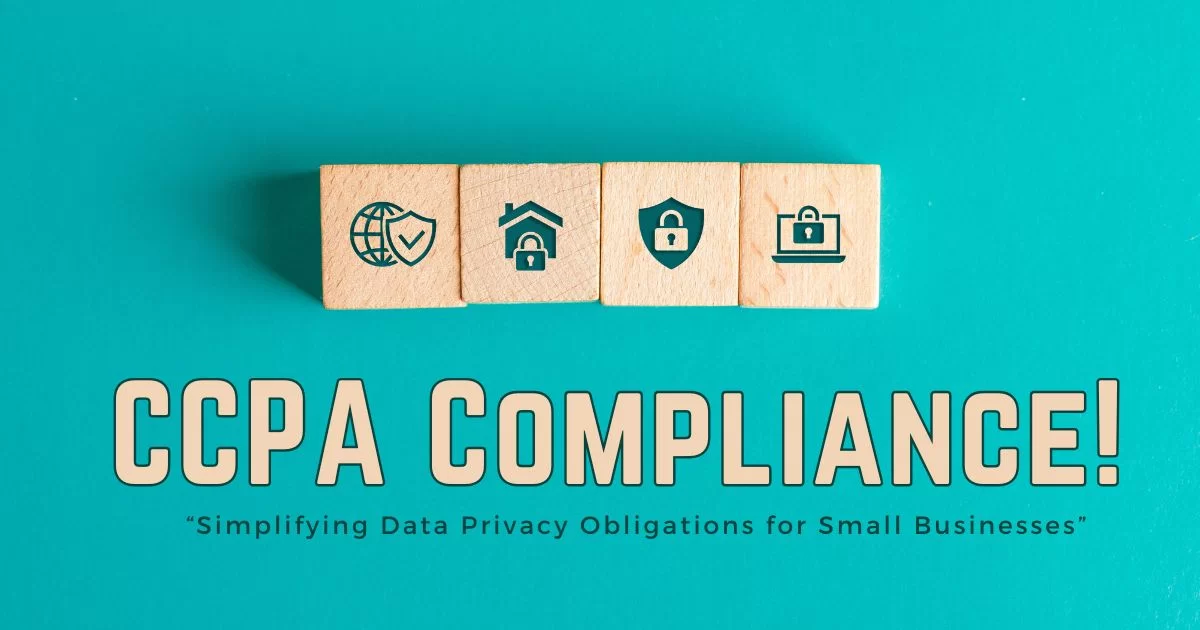
| December 2nd, 2024 |
CCPA Compliance Checklist for Small Businesses — Simplifying Data Privacy Obligations!
The California Consumer Privacy Act (CCPA compliance) is a landmark legislation aimed at protecting consumer data. For small businesses, it brings specific challenges and opportunities. With the 2024 updates to privacy laws, including the California Privacy Rights Act (CPRA), compliance has become even more critical. This guide simplifies the process, offering actionable steps to help small businesses align with these regulations while fostering customer trust.
CCPA Compliance Checklist for Small Businesses —
1. Understand Your Applicability:
Small businesses are subject to CCPA if they meet any of the following:
- Annual gross revenue exceeds $25 million.
- Handle data of 100,000 or more California residents annually.
- Derive 50% or more of annual revenue from selling personal data.
2. Develop a Transparent Privacy Policy:
Create a clear, concise privacy policy outlining:
- Types of data collected.
- Purpose of data use.
- Consumers’ rights under the CCPA.
- Contact information for data inquiries.
Ensure the policy is easily accessible, regularly updated, and user-friendly.
3. Conduct Data Mapping and Inventory:
Identify all personal data your business collects, processes, and shares. This includes:
- Data sources.
- Storage locations.
- Third-party recipients.
Maintaining an accurate data map is crucial for handling consumer requests effectively.
4. Establish Processes for Consumer Rights Requests:
The CCPA grants consumers the right to:
- Know what personal data is collected.
- Request deletion of their data.
- Opt-out of the sale of their data.
Implement systems to handle these requests efficiently, including a “Do Not Sell My Personal Information” link on your website and a verification mechanism for identity authentication.
5. Strengthen Vendor Contracts:
Ensure all contracts with third-party vendors align with CCPA requirements by including:
- Clear data processing purposes.
- Obligations to maintain confidentiality.
- Provisions for assisting with compliance.
6. Adopt Security Measures:
While the CCPA does not prescribe specific security protocols, it requires businesses to protect data from breaches. Regularly audit your systems and implement measures such as encryption, access controls, and employee training.
7. Stay Updated on Privacy Laws:
With the CPRA enhancing the CCPA, businesses must adapt to changes such as:
- Stricter penalties for violations.
- Additional consumer rights, including data correction.
Monitoring legislative updates ensures ongoing compliance.
Managing Customer Data Requests —
Efficiently handling customer data requests is a cornerstone of compliance with the California Consumer Privacy Act (CCPA compliance).The act empowers consumers to exercise rights such as accessing, deleting, or opting out of data processing. Small businesses must establish clear, transparent, and secure processes to manage these requests, ensuring compliance while maintaining trust with their customers.
Managing these requests involves more than just technical preparedness; it requires a combination of process design, team training, and adherence to legal deadlines. Below are the key steps to ensure your business is equipped to handle customer data requests effectively.
Step 1: Create a Clear Request Submission Process –
Provide a straightforward method for consumers to submit requests, such as online forms or dedicated email addresses.
Step 2: Verify Consumer Identity –
Implement secure processes to confirm the identity of individuals requesting data access or deletion.
Step 3: Respond Within Deadlines –
CCPA mandates responses within 45 days, extendable by an additional 45 days under specific circumstances.
Step 4: Train Your Staff –
Educate your team on managing requests efficiently and maintaining compliance with legal standards.
Step 5: Document Your Responses –
Keep records of requests and your responses to demonstrate compliance in case of audits.
CCPA vs. GDPR vs. PCI DSS — Key Differences:
1. CCPA (California Consumer Privacy Act):
Focus: Consumer rights to access, delete, and opt-out of personal data processing.
Applicability: California-based consumers; thresholds apply to businesses.
Unique Feature: “Do Not Sell My Personal Information” option.
2. GDPR (General Data Protection Regulation):
Focus: Comprehensive data protection for EU residents.
Applicability: Global businesses processing EU residents’ data.
Unique Feature: Requires explicit consumer consent for data processing.
3. PCI DSS (Payment Card Industry Data Security Standard):
Focus: Securing payment card information.
Applicability: Any business handling credit card transactions.
Unique Feature: Technical and operational requirements for securing cardholder data.
Comparison Table —
| Aspect | CCPA | GDPR | PCI DSS |
| Focus | Consumer data rights | Comprehensive data protection | Payment card security |
| Applicability | California-based businesses | Global businesses processing EU data | All businesses handling credit cards |
| Penalties | Up to $7,500 per violation | 4% of global turnover or €20M | Loss of credit card processing ability |
Conclusion —
Navigating data privacy regulations like CCPA compliance, GDPR compliance, and PCI DSS may seem daunting, but breaking them down into actionable steps makes compliance achievable. For small businesses, aligning with these standards not only avoids penalties but also builds trust with customers, enhancing brand reputation. Regularly review your practices, update systems, and invest in training to remain compliant as privacy laws evolve.
Empower your business by prioritizing data privacy—it’s not just a legal requirement but a cornerstone of customer loyalty in the digital age.